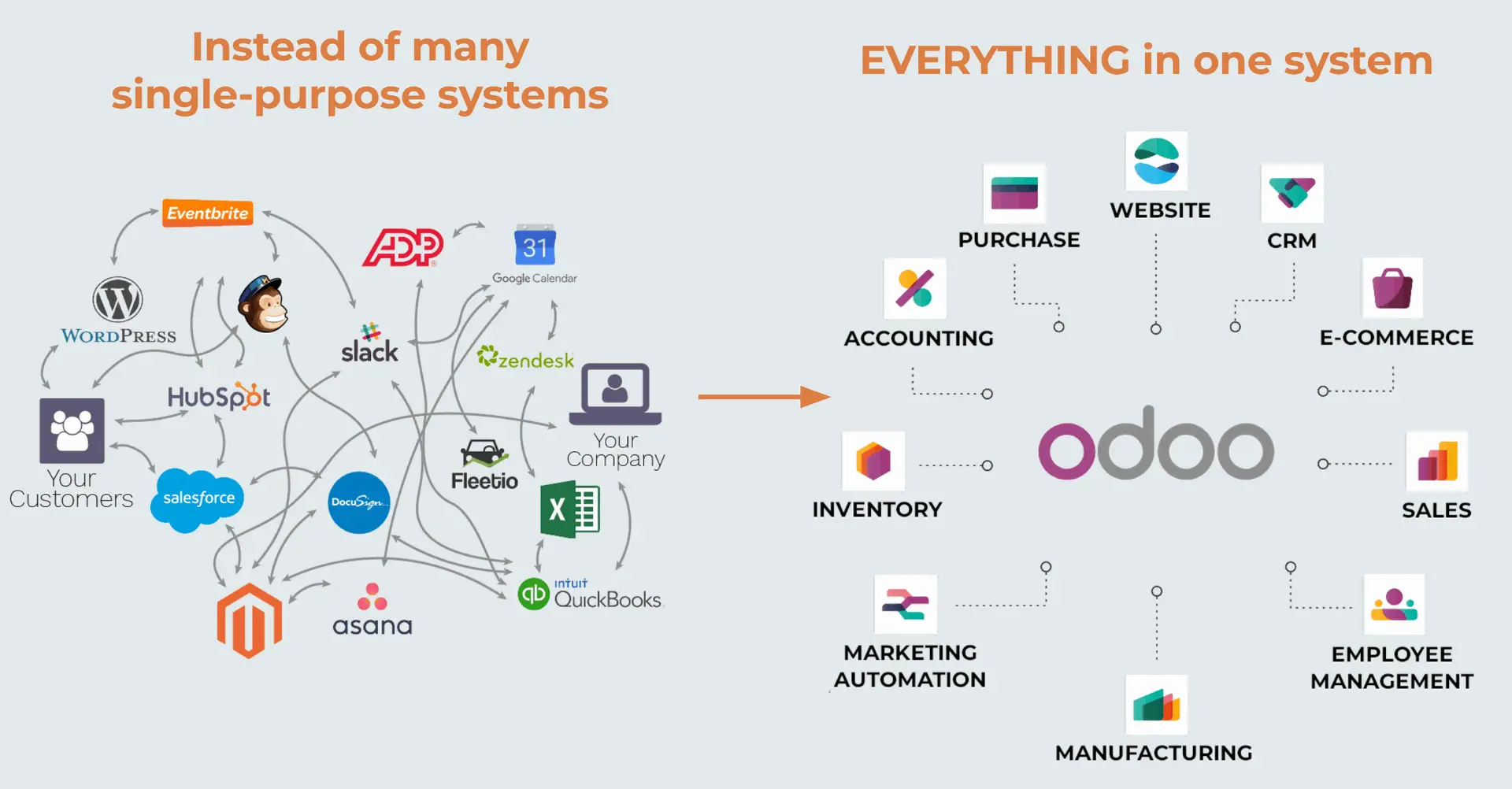One of the most common mistakes we see in businesses is using multiple separate systems to manage different operational needs. This usually includes ecommerce software, a CRM programme, payroll manager software, stock management software, and others.
Many company owners don’t realise that this lack of connection between departments and business processes is actually what brings the majority of their issues, including inefficiencies and unnecessary costs.
So, if you're wondering whether acquiring a single ERP system instead might be the right choice for your organisation, here are five compelling reasons the answer is YES:
1. Unified data management - Single source of truth
It’s not unusual that the owner of a company does not know where certain business information is or how to access it. For example, you keep approving budgets for a marketing campaign, yet don’t have a clue how many leads have come from it. This data is hidden away in some marketing platform or tool that only your marketing department is able to access.
ERP software aims to unify all business processes in a single platform to avoid this. Imagine all of your critical business data - finance, CRM, inventory, HR, manufacturing - residing in one, central, and easily accessible location. Instead of dealing with various spreadsheets and multiple sources of information from different programmes, an ERP ensures a single source of truth.
This also means:
- Reduced errors: Data is entered once and shared across all relevant modules, minimising typos and inconsistencies.
- Improved accuracy: Everyone works with the same, up-to-date information, leading to more reliable reporting.
- Enhanced consistency: Standardised data formats and processes create consistency across the organisation.
2. Seamless integration possibilities
One of the most significant advantages of an ERP is its inherent ability to integrate various business functions. Single-purpose systems, by their nature, often don't "talk" to each other without clunky workarounds or costly custom integrations. An ERP, however, is designed from the ground up to ensure that processes flow smoothly between one another. For instance, if a lead in the ERP CRM places an order, it can automatically trigger actions in the inventory module and create a record in the payroll manager software within the ERP.
This integration not only improves the overall workflow of the processes, boosting efficiency and productivity, but can help departments collaborate easier. Teams access and share relevant information, without having to contact each other directly. The information flows from one part of the system to another seamlessly, saving time and reducing the chance of errors or misunderstandings.
3. Full control of the business
When your systems are disparate, having a comprehensive overview of the business performance can be a laborious task, involving a lot of manual data collation from multiple different platforms. By centralising it all in a single platform, the ERP system provides full, real-time visibility of the entire organisation.
You have a dashboard and reports that pull data from different parts of the software, creating a live snapshot of the relevant KPIs (Key Performance Indicators). Managers, therefore, have a greater ability to monitor operations and identify any bottlenecks, encouraging a proactive rather than reactive management.
4. Easier scalability
As your business expands, your software needs to be able to adapt to the increasing demands. Relying on multiple single-purpose systems can make scaling very complex and costly. Each of these platforms will have to be updated to new pricing plans or new standalone solutions may need to be added. The costs rack up even more if tailor-made functionality is required, such as a connector between ecommerce software and a CRM software development.
With an ERP, you only have to worry about upgrading one system, which makes it much more simple. Not just that, business management software like Odoo works based on a modular design, meaning you can add new functionalities as and when you need them. The same goes for licences, as you can simply purchase new user subscriptions whenever you hire someone new.
As such, an ERP system can be perfectly suitable for both small and large companies. It’s particularly relevant to fast-growing SMEs, who can future-proof their operations, knowing that the software will be able to adapt to their ever-changing needs. In the meantime, they only have to pay for the functionality that is used currently.
5. Strategic decision-making
Effective strategic decisions rely on accurate, comprehensive, and timely information. When data is fragmented across various systems, it's difficult to get the full picture needed for robust planning. An ERP facilitates better strategic decision-making by providing comprehensive analytics with integrated data, whether that’s customer behaviour and trends, operational efficiencies, or financial performance.
The system holds all historical data, readily available in one place, such as the customers’ previous purchases and communication. Using it, companies can make more accurate predictions about the future, basing their decisions on data-driven analytics. It essentially takes guesswork out of strategy.
Odoo ERP could be the one you need
While single-purpose applications certainly have their place, especially for very small or niche operations, a growing business looking for more efficiency and control will find many advantages in an ERP system. It's an investment in a more connected, informed, and agile future for your organisation.
Odoo is one of the most powerful and cost-effective ERP systems on the market, rapidly growing in popularity all around the globe. It offers all the tools you need in one place, from manufacturing and inventory management to sales and human resources management.

As official Odoo partners, we’d be happy to demonstrate its powerful capabilities and functionality for your unique business needs!
Book your free consultation here:
